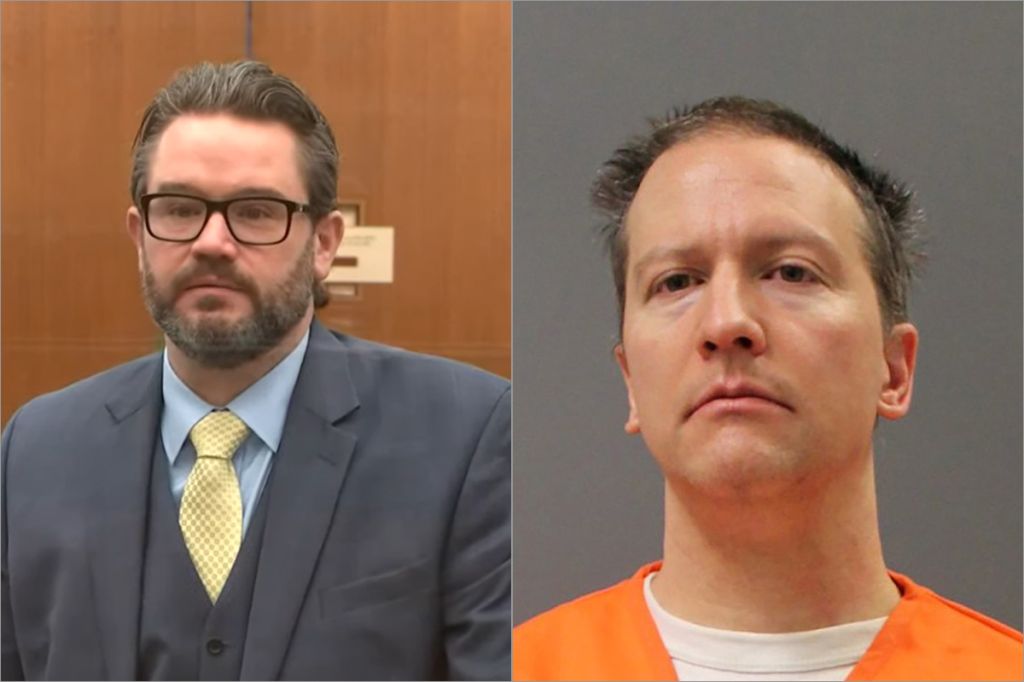Man Who Threatened To Kill Derek Chauvin’s Lawyer For Defending ‘A F****** Murderer’ Faces 5 Years In Prison
A protester holds a sign with a photo of former Minneapolis police officer Derek Chauvin during demonstrations following the death of George Floyd on May 30, 2020, in Los Angeles, California. | Source: Mario Tama / Getty
A Florida man who threatened to kill a lawyer for representing Derek Chauvin during the former Minneapolis cop’s murder trial is facing five years in prison.
William John Hartnett on Thursday admitted to the felony crime and pleaded guilty to the series of expletive-laden death threats he made against defense attorney Eric Nelson just weeks before Chauvin was found guilty and convicted for murdering George Floyd, according to a press release from the U.S. Attorney’s Office for the Southern District of Florida.
Hartnett pleaded guilty to one count of transmitting a threat through interstate communications stemming from an 18-second voicemail the 42-year-old Coral Gables resident left for Nelson at the Minnesota Police and Peace Officers Association, which helped pay Chauvin’s legal fees to Nelson.
Eric Nelson’s defense of Derek Chauvin is that it was reasonable for him to believe that George Floyd was just pretending to be dying pic.twitter.com/3OFL0YW7Wq
— Aaron Rupar (@atrupar) April 19, 2021
While no audio of the voicemail was immediately available to be heard, Hartnett’s words seemed like he meant business. In 18 seconds, he dropped six F bombs and managed to not only threaten to kill Nelson but also to do the same to his family.
The press release says Hartnett “yelled” the following voicemail message:
“Hey you and your whole f—— family are going to f—— die, you motherf—–, for representing Chauvin, a f—— murderer. Now, you all are going to f—— die a worse death than Floyd, you motherf—–. All of you piece of s—-.”
Harnett is scheduled to be sentenced on Dec. 15.
His guilty plea came one day after Chauvin and Nelson were in the news for a completely different yet very much related reason.
That was when the Minnesota Supreme Court suggested Chauvin was lying about his purported inability to pay for a lawyer to appeal his convictions. The Minneapolis Star-Tribune reported that Chief Justice Lorie Gildea on Wednesday “signed the order rejecting Chauvin’s claim that he’s too poor” and needs to be represented by a public defender.
Gildea said “Chauvin failed to prove he lacked the resources,” the Star-Tribune wrote in an unwitting reference to Nelson and the police unions that funded the disgraced former cop’s defense. Now that Chauvin has been convicted, the unions will not be paying for his appeal. It’s unclear how Chauvin will fund it, but clearly, Gildea believes he can.
As of Friday, Chauvin remained unrepresented by legal counsel.
Appealing his very recent convictions for third-degree murder, second-degree unintentional murder and second-degree manslaughter should be the least of Chauvin’s worries right now. After all, he’s got federal charges to deal with first.
Chauvin had the audacity last month to plead not guilty to two counts of federal civil rights violations in a case that alleges he assaulted a teenager in 2017. One count claims Chauvin “held the teenager by the throat and struck the teenager multiple times in the head with a flashlight.” The other count alleges Chauvin “held his knee on the neck and the upper back of the teenager even after the teenager was lying prone, handcuffed, and unresisting, also resulting in bodily injury.”
Sound familiar?
Chauvin was found guilty of murdering Floyd on April 20 and sentenced to 22.5 years in prison on June 25.
Hennepin County Judge Peter Cahill delivered the sentence on Friday afternoon after members of Floyd’s family and prosecutors appealed for the convicted murderer to get considerably more prison time than state guidelines advise.
Deciding against adjudicating the two lesser charges that Chauvin was facing, Cahill said the one count of unintentional second-degree murder for which he was sentencing included 10 additional years for aggravating factors, including employing “particular cruelty.”
Arguing that Chauvin’s crime is “more serious than the typical second-degree unintentional murder,” prosecutors asked for Cahill to sentence the former police officer to 360 months, which equals 30 years.
Nelson, Chauvin’s lawyer, argued that in an effort to eliminate sentencing disparity, the state’s guideline sentence “is what’s appropriate in this case.”
The aggravating factors that gave Cahill the green light to sentence Chauvin were because Floyd was killed in front of children, four of whom testified at the murder trial, including Darnella Frazier, who filmed the video that served as the primary piece of evidence in the case.
SEE ALSO:
Possible Derek Chauvin Federal Plea Deal Could Explain Cryptic Message To George Floyd’s Family
[ione_media_gallery id=”4101934″ overlay=”true”]

